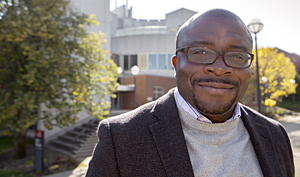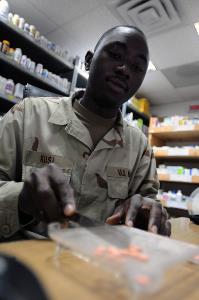Interview with Dr. Lucien Whembolua
Cold sweats. High fever. Vomiting. Diarrhea. Muscle pain. These are just some signs a person is infected with malaria. Professor Guy-Lucien Whembolua felt a few of these symptoms, as he lay in bed, his body’s temperature alternating between high fever and cold sweats. For a couple days, he was stuck in underneath blankets, fighting malaria. Then, about a week later, his nephew struggled with the same fight; he, too, had malaria.
 After suffering from the illness and watching his nephew go through the same agony, Dr. Whembolua, whose family hails from the Democratic Republic of the Congo, decided to do something about it. He made malaria the focus of his next research topic, so he can investigate ways to help the Congolese prevent malaria from occurring. During this year as a Taft Research Center Fellow, Whembolua is working on a book which concentrates upon the effects of malaria control on maternal and child mortality in the DRC – where malaria has become a dangerous epidemic.
After suffering from the illness and watching his nephew go through the same agony, Dr. Whembolua, whose family hails from the Democratic Republic of the Congo, decided to do something about it. He made malaria the focus of his next research topic, so he can investigate ways to help the Congolese prevent malaria from occurring. During this year as a Taft Research Center Fellow, Whembolua is working on a book which concentrates upon the effects of malaria control on maternal and child mortality in the DRC – where malaria has become a dangerous epidemic.
It is no surprise Whembolua wants to focus his research on malaria, especially since it is a large issue affecting so many who live in the DRC. Malaria also falls under a lot of his current research that deals with global health including immigrant health. Presently, Whembolua is an assistant professor of health policy and management in UC’s Department of Africana Studies and the director of the Africana Health Research Laboratory[1].
According to the World Health Organization, malaria kills about 200 children per day in the DRC (2017). Malaria, which is a disease of the blood, is spread through the bites of female mosquitoes. USAID 2013 statistics show the DRC has the second-highest number of malaria cases globally, which accounts for 11 percent of the total (2017). As stated on the WHO Web site, “Since many countries with malaria are already among the poorer nations, the disease maintains a vicious cycle of disease and poverty” (2017). Data provided by the World Bank illustrates a nasty sequence of how poverty leads to disease and vice versa. The World Bank ranks the DRC among the poorest countries in the world – 176 out of 187 countries (2017). The DRC has yet to decide to allocate the needed funds to buy the resources and supplies needed to help prevent malaria.
Despite the fact that a large part of the population are aware about malaria, few believe that it could be eradicated. “Individuals can know more about it,” Whembolua said. “Malaria has become a norm, and few think that it can be eradicated.” .tmb-medium.jpg?sfvrsn=414a7a46_1) The actual parasite that causes the illness first infects the mosquito, and then the disease is transmitted from the mosquito to the human. However, people can take action to stop the illness from spreading. For instance, according to the World Health Organization, Congolese can wear long-sleeved shirts, long pants, and hats to stop mosquitoes from biting the skin. Individuals can also use insect repellent to keep infected mosquitoes away. The use of bed nets is also an effective way of thwarting mosquitoes away.
The actual parasite that causes the illness first infects the mosquito, and then the disease is transmitted from the mosquito to the human. However, people can take action to stop the illness from spreading. For instance, according to the World Health Organization, Congolese can wear long-sleeved shirts, long pants, and hats to stop mosquitoes from biting the skin. Individuals can also use insect repellent to keep infected mosquitoes away. The use of bed nets is also an effective way of thwarting mosquitoes away.
Pregnant women are more susceptible to malaria, because they have lower immunity to malaria (Gilliam, 2015). However, there are many pregnant women who do not have the knowledge about how to prevent malaria, which can also hurt their unborn infants as well. According to Gilliam (2015), the baby could be underweight or die in utero. Malaria is also one of the reasons the DRC has high infant mortality (Gilliam, 2015). There are nurses, who travel from one village to another in the DRC, to deliver medical care just to pregnant women. A part of this care includes educating women about malaria. “There are numerous posters and songs and stickers about malaria, but fighting the disease is not just about raising awareness – there must also be tools to treat it and block its transmission with prevention,” Gilliam writes in the article (2015).
 Another challenge is that medicine can be difficult to obtain. “Most preventative medicines are imported from abroad,” Whembolua said. “Having to bring in the medicine from other countries makes it difficult for many families to pay for the cost. The price of the medicine can vary depending on the medication and how long a person needs the medication” the assistant professor said. Medical costs could be up to hundreds of dollars. Bringing in companies and creating medicines factories that make the medicine within the DRC would help the country achieve another level of independence, Whembolua added. However, building companies within the DRC brings up another challenge. The DRC has recently been in the center of what some would call “Africa’s world war,” and there is still much corruption in the country (BBC, 2017). In addition, the rebel forces are still being supported by neighboring governments of countries such as Uganda and Rwanda, and there is still violence in some eastern areas of the country (BBC, 2012 and 2017).
Another challenge is that medicine can be difficult to obtain. “Most preventative medicines are imported from abroad,” Whembolua said. “Having to bring in the medicine from other countries makes it difficult for many families to pay for the cost. The price of the medicine can vary depending on the medication and how long a person needs the medication” the assistant professor said. Medical costs could be up to hundreds of dollars. Bringing in companies and creating medicines factories that make the medicine within the DRC would help the country achieve another level of independence, Whembolua added. However, building companies within the DRC brings up another challenge. The DRC has recently been in the center of what some would call “Africa’s world war,” and there is still much corruption in the country (BBC, 2017). In addition, the rebel forces are still being supported by neighboring governments of countries such as Uganda and Rwanda, and there is still violence in some eastern areas of the country (BBC, 2012 and 2017).
In Cincinnati, Whembolua is fighting malaria through his research. "The Africana Health Research Lab was created to serve as a platform where researchers and students focusing on immigrant health and public health in low-income countries could perform research,” he said. The projects, conducted through the laboratory, align with much of Whembolua’s research; these research projects explore what socio-demographic, psychosocial, and environmental factors influence the mental and physical health of Africans throughout the world. “Immigrant health is a window to general population health since it involves health education, behavior, and healthcare access,” Whembolua said. “Moreover, the spread of infectious diseases is not stopped by country borders. Immigrant health is an important link between global health and domestic health. It can also reveal health inequalities.” Some of the lab project topics include: “breastfeeding among Africana populations in the United States,” “breastfeeding in the DRC,” and “HIV prevention in the DRC.”
The assistant professor is also the director of the Global Health Studies certificate. He also serves as the program chair of the American Public Health Association Caucus on Refugee and Immigrant Health.
To find out more about malaria, click here.
[1] The laboratory is housed in UC’s Department of Africana Studies.
BBC News. DR Congo country profile. 13 July 2017. BBC. 30 November 2017. <http://www.bbc.com/news/world-africa-13283212>.
BBC. Q&A: DR Congo Conflict. 20 November 2012. BBC. 30 November 2017. <http://www.bbc.com/news/world-africa-11108589>.
Centers for Disease Control and Prevention. Traveler's Health: Malaria. 14 July 2017. 30 November 2017. <https://wwwnc.cdc.gov/travel/diseases/malaria>.
Gilliam, Eva. "Fighting Malaria and maternal mortality, in the Democratic Republic of Congo." 22 April 2015. 30 November 2017. <https://www.unicef.org/infobycountry/drcongo_81663.html>.
Harcourt, Nonyeleum, et al. "Factors Associated with Breast and Cervical Cancer Screening Behavior Among African Immigrant Women in Minnesota." Journal of Immigrant and Minority Health 16.3 (2014): 450-456.
The World Bank. The World Bank in DRC. 2017 19 April. The World Bank. 28 November 2017. <http://www.worldbank.org/en/country/drc/overview>.
USAID. "Democratic Republic of Congo: Global Health." 21 April 2017. 2017 28 November. <https://www.usaid.gov/democratic-republic-congo/global-health>.
Whembolua, Guy-Lucien, Donaldson F. Conserve and Daudet Ilunga Tshiswaka. "Cultural Identity and Health Promotion: Assessing a Health Education Program Targeting African Immigrants in France." Journal of Pan African Studies 8.2 (2015).
World Health Organization. Global Health Observatory (GHO) data. 2017. 2017 November 2017. <http://www.who.int/gho/malaria/epidemic/deaths/en/>.
—. "Malaria." 2017. 28 November 2017. <http://www.who.int/hac/donorinfo/campaigns/cod/malaria/en/>.